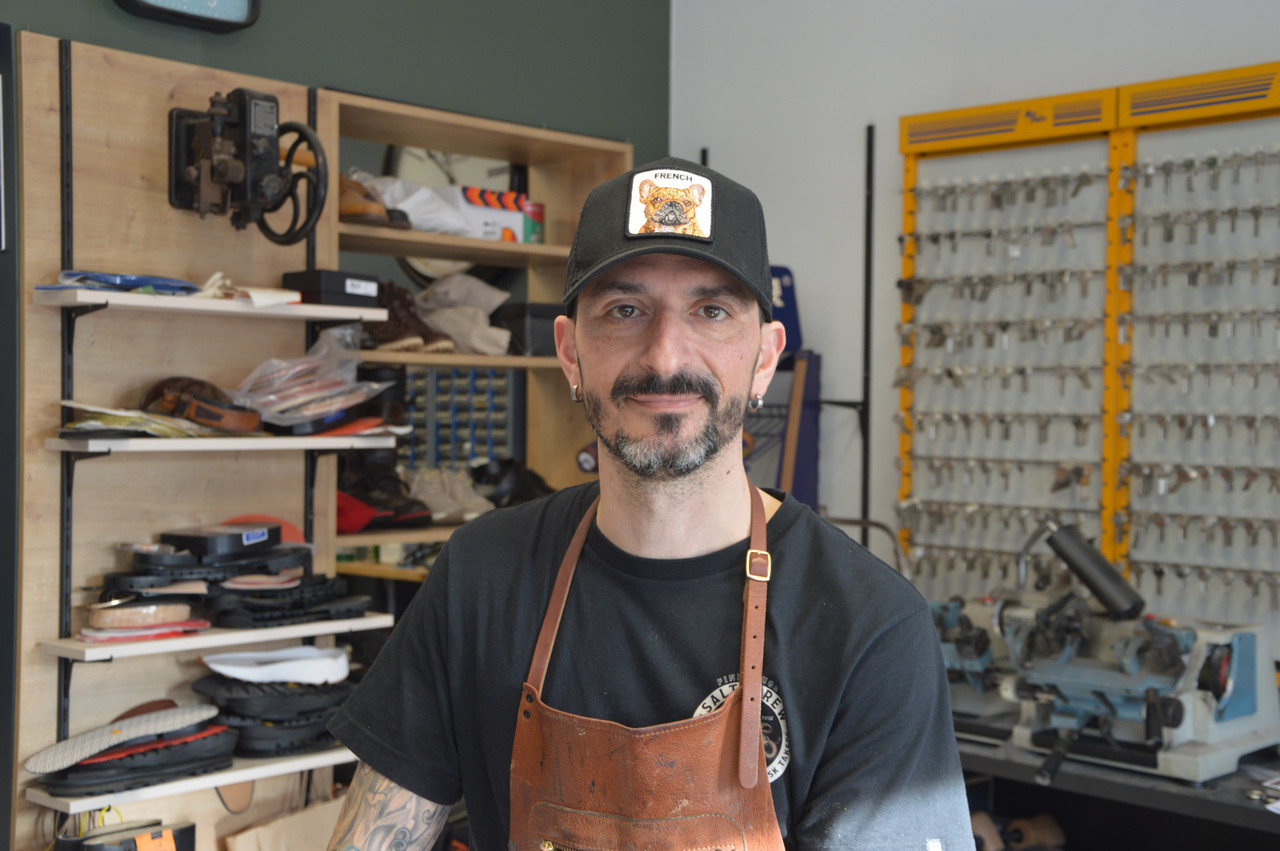Fewer than ten: that’s how many artisan shoemakers are currently operating in the country. Among them is David Mazzoni’s Cordonnerie & Co by David Mazzoni, in Bonnevoie. For the Mazzonis, shoemaking is a family affair, a skill passed down from father to son. David learned the trade from his father in his father’s shoe repair shop, also in Bonnevoie, just a few streets away from the present one, and from his uncle Gianfranco, who is still working in Esch at the age of 70.
In 2005, when his father retired, David Mazzoni bought out his father’s shares and took over the business on his own after training in technical business management. But 20 years later, his father is never far away. “He’s now retired, but he helps me out from time to time because it’s very difficult to find staff, and even harder to find well-trained staff,” says Mazzoni, busy refurbishing a pair of white trainers that many people would have thought were fit for the bin.
Giving a new lease of life to shoes, handbags and other leather objects has now become his passion, to the extent that his shop has become something of a second home. “For me, it’s not a chore, even though there’s a lot of work involved. I can’t think of a better job. Cleaning, repairing, restoring until you see a real difference between the ‘before’ and the ‘after’ is very satisfying. The sales and service aspect is also interesting, the demands change all the time, and the fact of working for yourself and being your own boss is a great adventure, even if it can be demotivating at times, with all the paperwork, tax, VAT, etc.,” confides the 42-year-old boss.
And working alone is an added difficulty. “When you’re working on a pair of shoes, for example, the processes can be complicated. The pressure to fix the sole has to be very precise, as does the drying time in the oven. If in the meantime a customer comes in, I have to be able to manage both,” he explains. In his view, this is due to a lack of appreciation of the trade, which is “seen as a secondary occupation,” and a lack of training opportunities. On its website, the Chamber of Trades indicates that a cross-border apprenticeship for the boot and shoemaker trade is possible. This involves an apprenticeship contract in a company in Luxembourg, but with theoretical training in a foreign school.

David Mazzoni renovates shoes and other leather objects and parts, as well as copying keys of all kinds. Photo: Maëlle Hamma/Maison Moderne
Despite some problems, Mazzoni adapts. First of all, he adapts to the ever-changing demands of his customers--a French-speaking customer who wants to have a set of keys replaced, an English-speaking customer who wants to have her riding harness repaired, or an Italian-speaking customer who wants to save her favourite pair of boots. But also to the changes in his profession and its constraints. “In 25 years, everything has changed: techniques, tools, equipment... Since covid, everything has really improved, both in terms of products and materials. Of course, you can still find a pair of soles for €10, but we focus on quality,” he explains.
Customers are paying more and more attention to quality. “I’d say that over the last three or four years, we’ve seen a big return to quality. Customers are paying more attention to materials and are prepared to pay the price. They take better care of their shoes, attach more importance to maintenance and pay more attention to protection. They no longer wait until the last minute to have their shoes repaired. More and more people are asking me, for example, to fit built-in irons on their shoes, to make them last longer,” he explains. Secondhand shoes are also part of this phenomenon, in his opinion. “I get a lot more luxury items than I used to,” he adds.

David Mazzoni works alone and focuses on quality, particularly for the soles that will be used to give a second life to his customers' shoes. Photo: Maëlle Hamma/Maison Moderne
This is good news at a time when fast fashion and its almost disposable items have an impact on both the environment and society. In Luxembourg, for example, an average of 12kg of textiles and shoes per person are thrown away every year. In Europe, four million tonnes of clothing waste are thrown away every year. This ecological awareness is also reflected in the demands of customers, “who are increasingly demanding about the composition of cleaning products. I’m getting more and more requests for organic products, products that haven’t been tested on animals, products that don’t use aerosols…”
What’s more, on social networks, accounts offering content centred on services such as sneaker refurbishment/customisation or the refurbishment of luxury bags are proliferating and enjoying a veritable craze. This trend reflects a growing interest in sustainability and more responsible fashion, as well as in the uniqueness and originality of the pieces.
For Mazzoni, it may also reveal a growing interest among young people in this craft, although they are not going so far as to train. “We need to recreate a training programme and encourage young people. The trade is more or less dying out, but I think it will continue to evolve. I still have hope!”
This article was originally published in .
